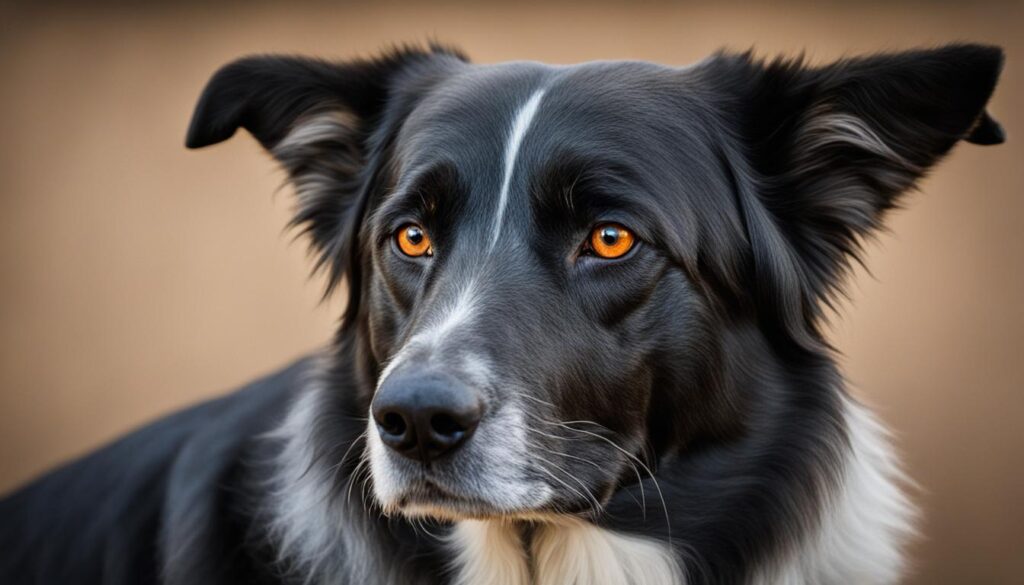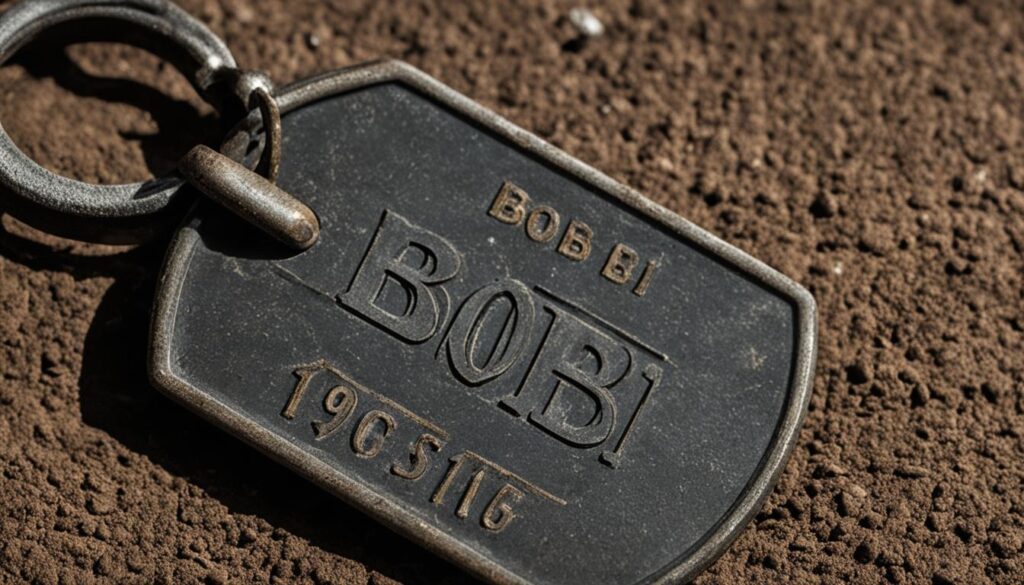The world of canine longevity has always fascinated dog lovers. Many wonder about the oldest dog in recorded history and the factors that contribute to their long lives. In this article, I will explore the records, breeds, and factors associated with the oldest dogs in recorded history.
Key Takeaways:
- Exploring the oldest dog in recorded history and their longevity is a topic that captivates dog lovers.
- Understanding the factors that contribute to a dog’s long life can provide insights for promoting canine longevity.
- Discovering the oldest dog breeds and ancient dog breeds can shed light on their remarkable lifespans.
- Examining the lifespan of dogs and the various factors that influence it can help enhance our understanding of canine aging.
- Unveiling the records and stories of exceptional dogs can inspire and inform us on extending our own dogs’ lifespan.
Bobi: The Controversial Record Holder

Bobi, a dog living in Portugal, holds the record for being the oldest dog ever recorded. However, there has been controversy surrounding the legitimacy of Bobi’s record. Questions have been raised about the changes in Bobi’s appearance in different images and the reliability of the genetic testing used to determine his age.
Despite being celebrated as the world’s oldest dog, Bobi’s record has faced scrutiny from skeptics. Concerns have been raised regarding the consistency of his physical appearance throughout the years. Some individuals argue that the variations in Bobi’s appearance across photographs suggest potential misidentification or inaccuracies in the reported age.
Additionally, the reliability of the genetic testing used to determine Bobi’s age has also been called into question. Although genetic testing can provide insights into a dog’s age and potential health conditions, some argue that it may not be infallible in accurately determining an animal’s true age.
Questions have been raised about the changes in Bobi’s appearance in different images and the reliability of the genetic testing used to determine his age.
The controversy surrounding Bobi’s record has sparked debates among experts and dog enthusiasts. While many acknowledge the significance of Bobi’s longevity, there is ongoing discussion about the authenticity of his record and the methods used to establish it.
Despite the controversy, Bobi’s story has captured the imagination of dog lovers around the world, highlighting the fascination and curiosity surrounding canine longevity.
The Telomere Test and Genetic Aging

One method used to determine Bobi’s age is a telomere test, which measures the length of telomeres in a dog’s chromosomes. Telomeres are protective caps at the ends of chromosomes that shorten with each cell division. While telomere length is associated with aging and health conditions, it is not a definitive indicator of a dog’s overall age or lifespan. Factors such as genetics, lifestyle, and environmental factors also influence telomere length.
The telomere test involves extracting DNA from a dog’s cells and analyzing the length of the telomeres. Shorter telomeres are generally associated with older age and increased likelihood of age-related health conditions. However, it is important to note that telomere length can vary among individuals of the same age.
Although the telomere test provides some insights into a dog’s genetic aging process, it should not be solely relied upon to determine the precise age of a dog. Other factors such as breed-specific traits, lifestyle, and environmental influences play significant roles in a dog’s overall aging process.
Genetic aging is a complex process that involves multiple factors and interactions. The length of telomeres is just one aspect, albeit an important one, of genetic aging. Understanding a dog’s genetic makeup and how it influences their aging process can contribute to better overall health and care.
Records and Evidence of Bobi’s Age

One of the key elements in confirming Bobi’s age is the availability of veterinarian and vaccination records. These records serve as important documentation of Bobi’s medical history and can provide evidence of his age. Additionally, the SIAC pet database, authorized by the Portuguese government, plays a crucial role in verifying the accuracy of Bobi’s age.
However, the authenticity of these records has been a subject of debate. Some argue that these records were never made public, raising questions about their reliability. Despite the skepticism surrounding the accessibility of these records, the personal account of Bobi’s owner adds credibility to his age.
Bob’s owner has shared the story of finding Bobi as a puppy and caring for him throughout his entire life. While personal accounts may not be as definitive as official records, they offer valuable insight into Bobi’s age and provide an additional layer of evidence.
Bobi’s Diet and Lifestyle

Bobi’s remarkable longevity can be attributed to his carefully curated diet and stress-free lifestyle. His diet heavily relied on fresh, unprocessed ingredients, inspired by the traditional Portuguese and Mediterranean eating habits. The Mediterranean diet is known for its health benefits, and Bobi’s diet reflected the same principles.
His meals consisted of a variety of nutritious foods such as fish, seafood, olive oil, fruits, vegetables, legumes, and whole grains. These ingredients provided Bobi with essential nutrients, antioxidants, and healthy fats that supported his overall health and vitality.
“Bobi’s diet exemplified the power of feeding dogs with fresh, wholesome ingredients. By nourishing him with natural foods, we aimed to provide him with sustainable energy and essential nutrients that supported his long, healthy life.” – Bobi’s owner
In addition to his balanced diet, Bobi enjoyed a stress-free lifestyle that allowed him to roam and explore his environment freely. He lived harmoniously with humans and other animals, which contributed to his overall well-being. This stress-free environment, combined with a healthy diet, played a significant role in Bobi’s longevity.
Bobi’s story serves as a timely reminder of the importance of proper nutrition and a stress-free lifestyle in ensuring the longevity of our beloved canine companions.
Factors Contributing to Canine Longevity
While Bobi’s case is remarkable, there are various factors that contribute to the longevity of dogs. These factors encompass genetic traits specific to breeds, overall health, as well as environmental considerations such as diet, exercise, and a stress-free lifestyle. It is important to recognize that the aging process in dogs is complex and influenced by multiple elements, making it challenging to pinpoint a single factor as the sole contributor to their longevity.
How Bobi’s Lifestyle Compares to Other Long-Lived Dogs

When it comes to promoting canine longevity, many dog owners in the fresh food community follow a similar lifestyle to Bobi. This lifestyle includes feeding their dogs fresh, homemade food, providing regular exercise, and creating a stress-free environment. While these practices have been associated with better overall health and well-being in dogs, it is important to note that not all dogs living this lifestyle reach record-breaking ages like Bobi.
The aging process in dogs can vary greatly, even among those living a similar lifestyle. Factors such as genetics and individual health conditions play a significant role in how dogs age. While a fresh food diet and a stress-free lifestyle can contribute to a dog’s well-being, they are not the sole determinants of longevity. Other factors, such as breed-specific traits and environmental influences, also come into play.
Factors Influencing Canine Longevity
Let’s explore some of the key factors that contribute to the aging process in dogs:
- Genetics: Different dog breeds have different lifespans, with some breeds naturally living longer than others. Genetic factors play a significant role in how dogs age, determining their susceptibility to certain health conditions and influencing their overall longevity.
- Diet and Nutrition: A balanced diet with fresh, high-quality ingredients can support a dog’s overall health and vitality. Providing dogs with nutrient-dense meals that meet their specific dietary needs is essential for promoting longevity.
- Exercise and Physical Activity: Regular exercise helps maintain a dog’s physical and mental well-being. By keeping dogs active, we can support their cardiovascular health, muscle strength, and cognitive function, which can contribute to a longer and healthier life.
- Mental Stimulation: Dogs thrive when their minds are stimulated. Providing mental enrichment through interactive toys, training sessions, and socialization can help prevent cognitive decline and promote a better quality of life as they age.
- Stress and Emotional Well-being: A stress-free environment is crucial for dogs’ overall well-being. Minimizing stressors and providing a safe, loving, and stimulating environment can help dogs lead happier and healthier lives.
While there is no one-size-fits-all approach to ensuring a dog’s longevity, learning from the practices of long-lived dogs like Bobi and implementing lifestyle changes that prioritize their health and well-being can increase the chances of a longer and happier life for our canine companions.
| Breed | Average Lifespan | Common Factors |
|---|---|---|
| Pomeranian | 12-16 years | Proper nutrition, regular grooming, regular exercise |
| Chihuahua | 12-20 years | Good healthcare, dental care, suitable diet |
| Shiba Inu | 12-16 years | Proper diet, regular exercise, mental stimulation |
| Australian Shepherd | 12-16 years | Active lifestyle, mental stimulation, balanced diet |
| Golden Retriever | 10-12 years | Good nutrition, regular exercise, preventive healthcare |
While these breeds have the potential to live long lives, it is important to remember that individual factors, such as genetics and overall health, can significantly influence a dog’s lifespan. By understanding these factors and providing dogs with the care they need, we can enhance their chances of a fulfilling and extended life.
The Legacy of Bobi and Reflections on Longevity

Bobi’s passing in October 2023 marked the end of an era, as he was the last living member of a long line of animals in his family. His remarkable age sparked discussions about what factors contributed to his longevity and whether he set a new standard for canine aging. While his record remains controversial, Bobi’s story has offered insights into the possibilities of extending the lifespan of our canine companions.
Throughout his life, Bobi captivated the hearts of dog lovers around the world. His incredible journey from a playful puppy to the oldest recorded dog has left behind a legacy that continues to inspire and fascinate. As we reflect on Bobi’s life, we are reminded of the potential for our furry friends to live long and fulfilling lives.
Bobi’s record-breaking age has prompted researchers, veterinarians, and dog owners to delve deeper into the factors that contribute to canine longevity. From genetics to diet and lifestyle, the quest to unlock the secrets of extended dog aging is ongoing. Bobi’s story serves as a reminder that our furry companions are capable of defying the odds and living well beyond our expectations.
The Effects of Aging on Dogs
As dogs age, their bodies undergo various changes, just like humans. Physical abilities may decline, and certain health issues may arise. However, Bobi’s exceptional age challenges the notion that aging is an inevitable decline. It encourages us to explore ways to promote healthy aging in our dogs.
“Bobi’s journey has shown us that age is just a number. By understanding the factors that contribute to longevity, we can strive to give our dogs the best possible quality of life as they grow older.”
Looking beyond the controversy surrounding Bobi’s record, his story has opened up the conversation about dog aging and the potential for them to live longer, healthier lives. While his genetic makeup and unique circumstances may have played a role in his remarkable longevity, there are valuable lessons we can learn from his life that can benefit all dogs.
| Factors Contributing to Canine Longevity | Description |
|---|---|
| Genetics | The genetic makeup of a dog can influence its overall health and lifespan. Certain breeds are known for their longevity, while others may be more prone to age-related health issues. |
| Diet and Nutrition | A balanced and nutritious diet can play a significant role in promoting healthy aging in dogs. Providing fresh, high-quality food with the necessary nutrients can support their overall well-being and slow down the effects of aging. |
| Exercise and Mental Stimulation | Regular physical exercise and mental stimulation are crucial for maintaining a dog’s physical and cognitive health. Keeping dogs active and engaged can improve their muscle tone, mental acuity, and overall vitality. |
| Veterinary Care | Regular check-ups, vaccinations, and preventive care help identify and address any health issues before they escalate. Routine veterinary care ensures that dogs receive appropriate treatments and interventions to support their longevity. |
| Stress Reduction | A calm and stress-free environment is essential for a dog’s overall well-being. Minimizing stressors, providing a consistent routine, and offering a secure space can contribute to their longevity and happiness. |
By incorporating these factors into our dogs’ lives, we can create an environment that promotes healthy aging and increases their chances of living a long and fulfilling life.
While Bobi’s record may continue to be debated, his story has sparked a newfound curiosity and drive to unravel the mysteries of dog aging. The legacy he leaves behind is a reminder that our beloved companions have the potential to defy expectations and age gracefully. As we continue to explore and understand the factors that contribute to canine longevity, we may uncover new ways to extend the lifespan of our furry friends and give them the fulfilling lives they deserve.
Wrapping Up
The story of Bobi, the world’s oldest dog, has captivated dog lovers around the globe. Despite the controversy surrounding his record, Bobi’s remarkable age has sparked important discussions about the potential for dogs to live longer and healthier lives. By examining the factors that may contribute to canine longevity, such as genetic factors, a balanced diet, regular exercise, and a stress-free lifestyle, we can glean valuable insights from Bobi’s story and apply them to our own furry companions to promote their well-being and extend their lifespans.
While the debate over the oldest dog ever recorded may continue, it is undeniable that Bobi’s story has opened up new possibilities for understanding canine longevity. By considering the role of genetics in a dog’s health, the impact of a nutrient-rich diet on their overall well-being, the significance of regular physical activity in maintaining their vitality, and the importance of a calm and peaceful environment, we can positively influence the lives of our beloved pets. Bobi serves as an inspiration for dog owners to prioritize these elements and offer the best possible care to their four-legged friends.
As we reflect on Bobi’s impressive lifespan and the lessons it teaches us, we can strive to create a nurturing and supportive environment for our dogs. By providing them with the resources they need to thrive, we enable them to live their best lives and age gracefully. While each dog is unique and their longevity is influenced by a variety of factors, including breed-specific traits, it is clear that there is much to be learned from Bobi’s story. By embracing the concepts of genetic health, proper nutrition, regular exercise, and a stress-free lifestyle, we can make a positive impact on the well-being and longevity of our canine companions.
FAQ
What is the record for the oldest dog ever recorded?
The record for the oldest dog ever recorded is held by Bobi, a dog living in Portugal. However, there has been controversy surrounding the legitimacy of Bobi’s record.
How is a dog’s age determined?
A dog’s age can be determined through various methods, including veterinarian records, vaccination records, and genetic testing such as the telomere test. However, these methods may not provide a definitive indicator of a dog’s overall age or lifespan.
What evidence supports Bobi’s age?
The evidence supporting Bobi’s age includes veterinarian and vaccination records, as well as the SIAC pet database authorized by the Portuguese government. However, the authenticity of these records has been questioned.
What factors contribute to a dog’s longevity?
A dog’s longevity is influenced by genetic factors, such as breed-specific traits and overall health, as well as environmental factors like diet, exercise, and a stress-free lifestyle.
Does Bobi’s lifestyle reflect that of other long-lived dogs?
While Bobi’s lifestyle, including a fresh food diet and a stress-free environment, is followed by many dog owners in the fresh food community, it’s important to note that not all dogs living this lifestyle reach record-breaking ages like Bobi.
What is the legacy of Bobi’s story?
Bobi’s story has sparked conversations about canine longevity and the potential for dogs to live longer, healthier lives. It offers insights into the factors that may contribute to longevity and encourages dog owners to apply these practices to promote their own dogs’ well-being.
What conclusions can be drawn about canine longevity from Bobi’s case?
Bobi’s remarkable age and the controversy surrounding his record have served as a reminder of the complexities of the aging process in dogs. While his story provides valuable insights, it’s important to recognize that dog aging is influenced by various factors, making it difficult to pinpoint a single factor as the sole contributor to longevity.






